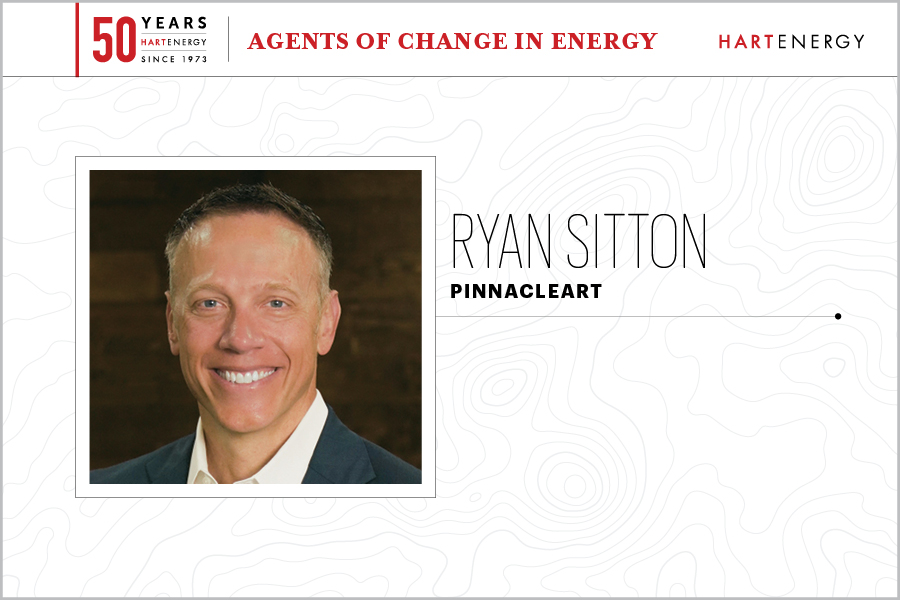Ryan Sitton
Editor's note: This profile is part of Hart Energy's 50th anniversary Hall of Fame series honoring industry pioneers of the past 50 years and the Agents of Change (ACEs) who are leading the energy sector into the future.

Then a commissioner with Texas’ poorly named Railroad Commission that regulates oil and gas—not locomotives—Ryan Sitton suddenly found himself in the throes of the pandemic and a global oil price war between the Saudis and Russians in early 2020.
Sitton, tilting at metaphorical windmills, helped push a plan endorsed by some—but not most—oil producers to force the temporary limitation of Texas production volumes to help stabilize prices. The unpopular effort failed mightily, but, less than a month later, the benchmark oil price fell into negative pricing territory for the first time ever.
Sitton, after all, was just following the data.
And that’s what he continues to do as the CEO of Pinnacle, which he founded in 2006, for industrial data solutions and analyses. And the company is continuing to grow in today’s age of artificial intelligence (AI).
“We have always been a company that went out and pulled together all of this data and did complex system analysis,” Sitton told Hart Energy. “But, in 2006, data science was not a thing. People who used statistics and data aggregation were not sexy. In fact, it was really boring.
“Fast forward, and this thing we’ve been doing for 17 years all of a sudden is incredibly sexy. And, fortunately for us, we got into it very early.”
Pinnacle now focuses on preventative systems modeling and analyses for the biggest oil and gas facilities, refineries, petrochemical plants and other massive manufacturing facilities. Specifically, Pinnacle focuses on the machine learning realm of AI.
Sitton compares Pinnacle’s software-driven business model to the savings drivers now get from vehicle computers analyzing when an oil change is needed. Drivers are saving money because they no longer have to get their vehicles serviced every 3,000 miles or three months, whichever came first, because now they can wait longer for when their vehicles more accurately alert them of the need.
“Well, scale that up across the most complicated facilities on Earth,” Sitton said. “It’s not that hard to figure out the optimal time to change my oil, but there’s only 600 refineries in the world, and they’re all unique animals. So, there’s no easy way to figure out the optimal time to change that oil or do that inspection or change those tires. So, you’re talking about facilities that are 1,000 times more complicated than your truck, and where the dollar impacts are 10,000 times the size.”
Moving the needle
On the Railroad Commission, Sitton often bucked the established power structure, but he still helped to move the needle on necessary well plugging and abandonment issues, as well as wastewater challenges. And he also drove more attention to the ever-quixotic effort to get the Railroad Commission out of the shadows and renamed to something that actually fits its responsibilities.
So, despite his frustrations, Sitton still feels like he accomplished a lot during his six years as a politician.
But it’s his work as an entrepreneur where he believes he’s making the biggest difference.
Sitton started his career in the OxyChem side of Occidental Petroleum before moving onto Marathon Petroleum. He later left for a leadership assignment in Australia, ultimately starting a new division for the smaller firm Berwanger Inc.
“So it turned out to be a real blessing because I went there to do small-project engineering and ended up turning into somewhat of a small business entrepreneur.”
That experience proved invaluable when Siemens acquired Berwanger and laid him off. His Berwanger work gave him the confidence he needed to branch out and found Pinnacle.
The initial Pinnacle Asset Integrity Services company focused on fixed, stationary equipment in the energy sector. But acquisitions and experience brought Pinnacle to service some of the world’s biggest and most complicated industrial facilities.
Pinnacle became PinnacleART in 2015 after acquiring Advanced Reliability Technologies. Then rebranded to just Pinnacle in 2020, focused on “data-driven reliability.” Since then, the company has acquired Trinity Bridge, a specialty risk-based inspection firm and, more recently, AllAssets from Lloyd’s Register.
Next, Sitton is even eyeing an expansion into health care, using data analysis for diets, sleep habits, genome mapping and more.
If Pinnacle can help with the reliability of refineries, he said, “We can really help the reliability of the human race.”
—Jordan Blum, Editorial Director
